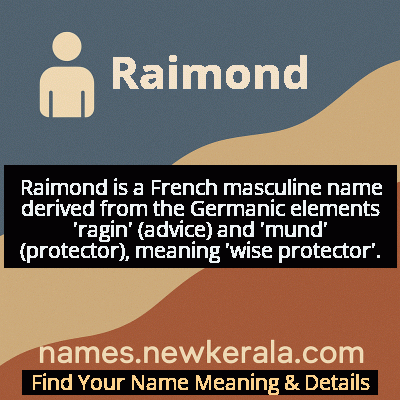Raimond Name Meaning & Details
Origin, Popularity, Numerology Analysis & Name Meaning of Raimond
Discover the origin, meaning, and cultural significance of the name RAIMOND. Delve into its historical roots and explore the lasting impact it has had on communities and traditions.
Name
Raimond
Gender
Male
Origin
French
Lucky Number
2
Meaning of the Name - Raimond
Raimond is a French masculine name derived from the Germanic elements 'ragin' (advice) and 'mund' (protector), meaning 'wise protector'.
Raimond - Complete Numerology Analysis
Your Numerology Number
Based on Pythagorean Numerology System
Ruling Planet
Moon
Positive Nature
Diplomatic, friendly, artistic, empathetic.
Negative Traits
Over-sensitive, moody, indecisive, prone to self-pity.
Lucky Colours
Green, cream, white.
Lucky Days
Monday.
Lucky Stones
Pearl, moonstone.
Harmony Numbers
1, 3, 4.
Best Suited Professions
Diplomats, mediators, caregivers, artists.
What People Like About You
Cooperative spirit, friendliness, artistic talent.
Famous People Named Raimond
Raimond Aumann
Footballer
German goalkeeper who won the 1990 FIFA World Cup and played for Bayern Munich
Raimond van der Gouw
Footballer
Dutch goalkeeper who played for Manchester United and won multiple Premier League titles
Raimond Valgre
Composer
Estonian composer known for popular songs and film music during Soviet era
Raimond Berenger
Noble
Count of Provence who established the court of Provence as a cultural center
Name Variations & International Equivalents
Click on blue names to explore their detailed meanings. Gray names with will be available soon.
Cultural & Historical Significance
Extended Personality Analysis
People named Raimond are typically characterized by their balanced combination of protective instincts and intellectual depth. They embody the name's meaning of 'wise protector' through their natural tendency to safeguard others while offering thoughtful guidance. Raimonds often display remarkable emotional intelligence, allowing them to understand complex social dynamics and provide appropriate support. Their protective nature isn't aggressive but rather manifests as careful planning and preventive thinking—they anticipate challenges and prepare accordingly. These individuals tend to be excellent problem-solvers who approach difficulties with methodical analysis rather than impulsive reactions. In relationships, Raimonds are known for their loyalty and reliability, often becoming the 'rock' that friends and family depend on during turbulent times. While they can appear reserved to strangers, those who know them well appreciate their dry wit and deep capacity for caring. Their wisdom typically shows in practical life decisions, financial planning, and career choices that prioritize long-term stability over short-term gains.
Modern Usage & Popularity
In contemporary naming trends, Raimond occupies an interesting position as a classic name that hasn't experienced the massive revival seen with some other traditional names. Its usage remains most consistent in French-speaking regions like France, Belgium, Switzerland, and Quebec, where it maintains a sophisticated, educated appeal. While not appearing on most popular baby name lists, Raimond continues to be chosen by parents seeking a name with historical depth and international recognition. The name's relative rarity in modern times adds to its distinctive charm, appealing to families who want traditional roots without being overly common. Interestingly, Raimond has seen some resurgence among parents interested in medieval history or those with specific French cultural connections. Its usage patterns show it's often selected by older parents or those with higher education levels who appreciate its intellectual and noble connotations. The name's stability in usage suggests it will remain a classic choice rather than following dramatic popularity swings.
Symbolic & Spiritual Meanings
Symbolically, Raimond represents the harmonious integration of protection and wisdom—the ideal of the guardian who protects through knowledge rather than force. This name embodies the concept of enlightened leadership where strength is tempered by intelligence and compassion. In metaphorical terms, Raimond symbolizes the bridge between tradition and progress, honoring historical wisdom while adapting to contemporary challenges. The name carries deep archetypal significance as the 'wise old man' or mentor figure who guides others through difficult transitions. It also represents the idea of emotional and intellectual shelter—creating safe spaces where others can grow and develop. In broader symbolic contexts, Raimond signifies the balance between action and contemplation, suggesting that true protection comes from understanding rather than domination. The name's etymological roots in both counsel and protection make it a powerful symbol for integrated masculinity that combines strength with sensitivity, making it relevant for modern interpretations of leadership and guardianship.

